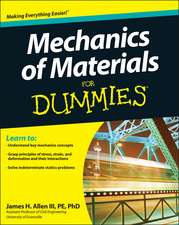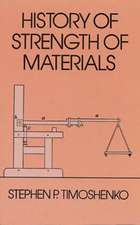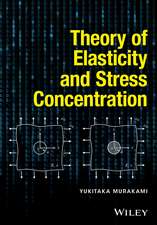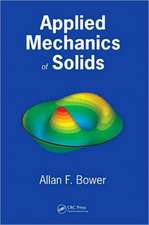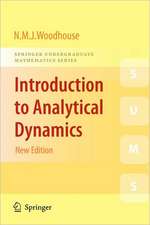The Linearized Theory of Elasticity
Autor William S. Slaughteren Limba Engleză Paperback – 21 oct 2012
| Toate formatele și edițiile | Preț | Express |
|---|---|---|
| Paperback (1) | 794.07 lei 6-8 săpt. | |
| Birkhäuser Boston – 21 oct 2012 | 794.07 lei 6-8 săpt. | |
| Hardback (1) | 799.12 lei 6-8 săpt. | |
| Birkhäuser Boston – 14 dec 2001 | 799.12 lei 6-8 săpt. |
Preț: 794.07 lei
Preț vechi: 968.38 lei
-18% Nou
Puncte Express: 1191
Preț estimativ în valută:
151.96€ • 158.45$ • 126.30£
151.96€ • 158.45$ • 126.30£
Carte tipărită la comandă
Livrare economică 21 martie-04 aprilie
Preluare comenzi: 021 569.72.76
Specificații
ISBN-13: 9781461266082
ISBN-10: 1461266084
Pagini: 572
Ilustrații: XXV, 543 p.
Dimensiuni: 155 x 235 x 30 mm
Greutate: 0.79 kg
Ediția:Softcover reprint of the original 1st ed. 2002
Editura: Birkhäuser Boston
Colecția Birkhäuser
Locul publicării:Boston, MA, United States
ISBN-10: 1461266084
Pagini: 572
Ilustrații: XXV, 543 p.
Dimensiuni: 155 x 235 x 30 mm
Greutate: 0.79 kg
Ediția:Softcover reprint of the original 1st ed. 2002
Editura: Birkhäuser Boston
Colecția Birkhäuser
Locul publicării:Boston, MA, United States
Public țintă
GraduateCuprins
1 Review of Mechanics of Materials.- 1.1 Forces and Stress.- 1.2 Stress and Strain.- 1.3 Torsion of Circular Cylinders.- 1.4 Bending of Prismatic Beams.- Problems.- 2 Mathematical Preliminaries.- 2.1 Scalars and Vectors.- 2.2 Indicial Notation.- 2.3 Tensors.- 2.4 Tensor Calculus.- 2.5 Cylindrical and Spherical Coordinates.- Problems.- 3 Kinematics.- 3.1 Configurations.- 3.2 Strain Tensors: Referential Formulation.- 3.3 Strain Tensors: Spatial Formulation.- 3.4 Kinematic Linearization.- 3.5 Cylindrical and Spherical Coordinates.- Problems.- 4 Forces and Stress.- 4.1 Stress Tensors: Referential Formulation.- 4.2 Stress Tensors: Spatial Formulation.- 4.3 Kinematic Linearization.- 4.4 Cylindrical and Spherical Coordinates.- Problems.- 5 Constitutive Equations.- 5.1 Elasticity.- 5.2 Constitutive Linearization.- 5.3 Material Symmetry.- 5.4 Isotropic Materials.- 5.5 Cylindrical and Spherical Coordinates.- Problems.- 6 Linearized Elasticity Problems.- 6.1 Field Equations.- 6.2 Boundary Conditions.- 6.3 Useful Consequences of Linearity.- 6.4 Solution Methods.- Problems.- 7 Two-Dimensional Problems.- 7.1 Antiplane Strain.- 7.2 Plane Strain.- 7.3 Plane Stress.- 7.4 Airy Stress Function.- Problems.- 8 Torsion of Noncircular Cylinders.- 8.1 Warping Function.- 8.2 Prandtl Stress Function.- Problems.- 9 Three-Dimensional Problems.- 9.1 Field Theory Results.- 9.2 Potentials in Elasticity.- 9.3 Dislocation Surface.- 9.4 Eshelby’s Inclusion Problems.- Problems.- 10 Variational Methods.- 10.1 Calculus of Variations.- 10.2 Energy Theorems in Elasticity.- 10.3 Approximate Solutions.- Problems.- 11 Complex Variable Methods.- 11.1 Functions of a Complex Variable.- 11.2 Antiplane Strain.- 11.3 Plane Strain/Stress.- Problems.- Appendix: General Curvilinear Coordinates.- A.l General VectorBases.- A.1.1 Covariant and Contravariant Components.- A.1.2 Reciprocal Bases.- A.l.3 Higher-Order Tensors.- A.2 Curvilinear Coordinates.- A.2.1 Cartesian Coordinates.- A.2.2 Cylindrical Coordinates.- A.2.3 Spherical Coordinates.- A.2.4 Metric Tensor in a Natural Vector Basis.- A.2.5 Transformation Rule for Change of Coordinates.- A.3 Tensor Calculus.- A.3.l Gradient.- References.
Recenzii
"There is a good balance between theory and practical applications…[the] approach acknowledges the basic concepts of continuum mechanics without burdening the presentation with excessive generalities. The assumptions required to obtain linear results from nonlinear results are clearly described. This enables students to clearly understand the limitations of linear results…the book includes a good range of discussion and examples…to motivate and complement the theory…[it] is written in a clear style…[and] can be recommended as a good example of a modern textbook in this field." —Applied Mechanics Review
"This very accessible book will be of interest in teaching or learning linear elasticity." —Zentralblatt Math
"The book presents classical parts of the linearized theory of elasticity in a selfcontained way that seems to be a fine compromise between the necessity of a deep mathematical insight and the accessibility of exposition. The author points out that the book is intended as a text for a first-year graduate course in mechanical or civil engineering. ...Many figures and solved examples contribute to the clarity of exposition. Moreover, each chapter finishes with a subsection of unresolved problems, hints being often given. The material in the book is well organized, presented in a lucid way, and can reach a fairly broad audience spanning from advanced undergraduate students to graduate students. Professionals and researchers may enjoy this book for its clarity and instructive examples, as well as a refreshing reminder of the classical results of the linearized theory of elasticity." —Applications of Mathematics
"This book is a modern treatment of the linearized theory of elasticity, presented as a specialization of the general theory of continuum mechanics. It is derived from notes used by the author in teaching a first-yeargraduate-level course in elasticity…. Presented [are] various results connected to functions of a complex variable, strain, plane strain/stress, etc.… Each chapter ends with a useful list of problems.
The book is clearly written, with rigorous presentation, in a pleasant and accessible style. This new text is an excellent resource devoted to introduce the students in mechanical or civil engineering to the linearized theory of elasticity. It is warmly recommended to all researchers in the field." —Revue D’Analyse Numérique et de Théorie de L’Approximation
"This very accessible book will be of interest in teaching or learning linear elasticity." —Zentralblatt Math
"The book presents classical parts of the linearized theory of elasticity in a selfcontained way that seems to be a fine compromise between the necessity of a deep mathematical insight and the accessibility of exposition. The author points out that the book is intended as a text for a first-year graduate course in mechanical or civil engineering. ...Many figures and solved examples contribute to the clarity of exposition. Moreover, each chapter finishes with a subsection of unresolved problems, hints being often given. The material in the book is well organized, presented in a lucid way, and can reach a fairly broad audience spanning from advanced undergraduate students to graduate students. Professionals and researchers may enjoy this book for its clarity and instructive examples, as well as a refreshing reminder of the classical results of the linearized theory of elasticity." —Applications of Mathematics
"This book is a modern treatment of the linearized theory of elasticity, presented as a specialization of the general theory of continuum mechanics. It is derived from notes used by the author in teaching a first-yeargraduate-level course in elasticity…. Presented [are] various results connected to functions of a complex variable, strain, plane strain/stress, etc.… Each chapter ends with a useful list of problems.
The book is clearly written, with rigorous presentation, in a pleasant and accessible style. This new text is an excellent resource devoted to introduce the students in mechanical or civil engineering to the linearized theory of elasticity. It is warmly recommended to all researchers in the field." —Revue D’Analyse Numérique et de Théorie de L’Approximation
Caracteristici
Request lecturer material: sn.pub/lecturer-material

